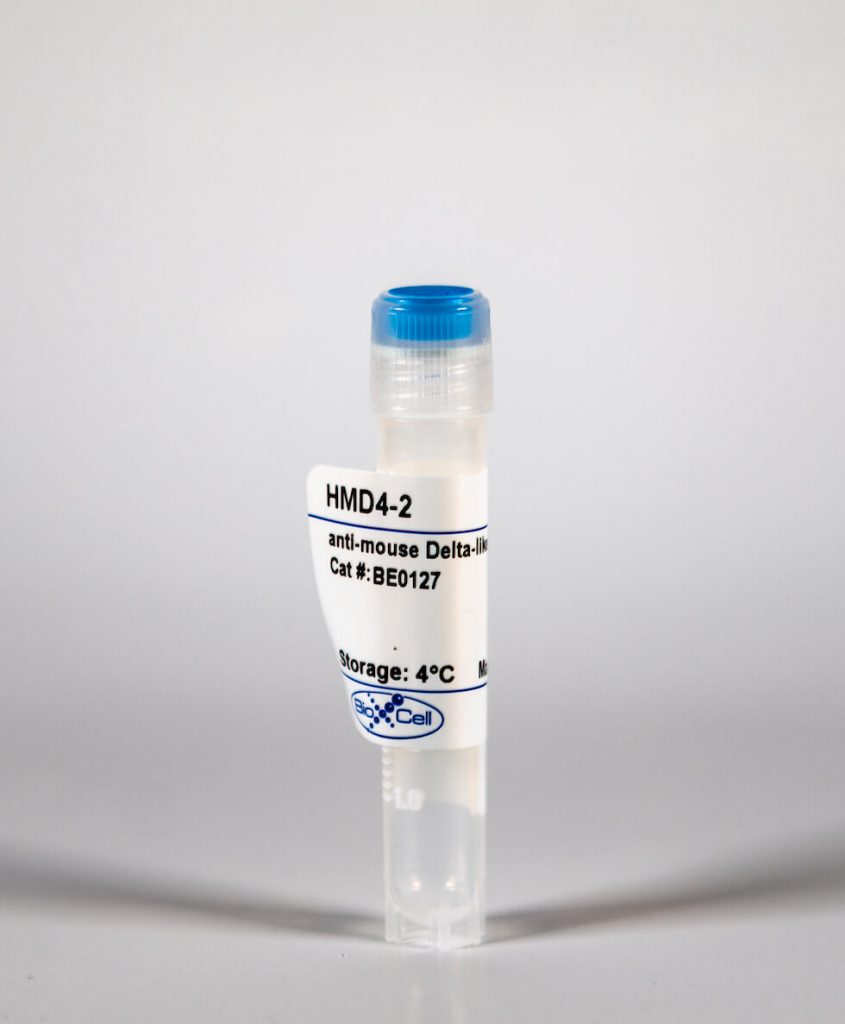InVivoMab anti-mouse Delta-like protein 4 (DLL4)
| Clone | HMD4-2 | ||||||||||||
|---|---|---|---|---|---|---|---|---|---|---|---|---|---|
| Catalog # | BE0127 | ||||||||||||
| Category | InVivoMab Antibodies | ||||||||||||
| Price |
|
The HMD4-2 monoclonal antibody reacts with mouse Delta-like protein 4 (DLL4) one of many Notch ligands. DLL4 is expressed by vascular endothelium, and plays a vital role in embryonic vascular development. The Notch pathway is an important intercellular signaling pathway that plays a major role in controlling cell fate. The HMD4-2 antibody has been shown to neutralize DLL4 in vivo.
| Isotype | Armenian Hamster IgG, κ |
| Recommended Isotype Control(s) | InVivoMAb polyclonal Armenian hamster IgG |
| Recommended Dilution Buffer | InVivoPure™ pH 7.0 Dilution Buffer |
| Immunogen | Recombinant mouse DLL4 |
| Reported Applications | in vivo DLL4 neutralization |
| Formulation |
|
| Endotoxin |
|
| Purity |
|
| Sterility | 0.2 μM filtered |
| Production | Purified from tissue culture supernatant in an animal free facility |
| Purification | Protein G |
| RRID | AB_10950366 |
| Molecular Weight | 150 kDa |
| Storage | The antibody solution should be stored at the stock concentration at 4°C. Do not freeze. |
InVivoMAb anti-mouse Delta-like protein 4 (DLL4) (Clone: HMD4-2)
Fukuda, D., et al. (2012). “Notch ligand delta-like 4 blockade attenuates atherosclerosis and metabolic disorders.” Proc Natl Acad Sci U S A 109(27): E1868-1877. PubMed
Atherosclerosis and insulin resistance are major components of the cardiometabolic syndrome, a global health threat associated with a systemic inflammatory state. Notch signaling regulates tissue development and participates in innate and adaptive immunity in adults. The role of Notch signaling in cardiometabolic inflammation, however, remains obscure. We noted that a high-fat, high-cholesterol diet increased expression of the Notch ligand Delta-like 4 (Dll4) in atheromata and fat tissue in LDL-receptor-deficient mice. Blockade of Dll4-Notch signaling using neutralizing anti-Dll4 antibody attenuated the development of atherosclerosis, diminished plaque calcification, improved insulin resistance, and decreased fat accumulation. These changes were accompanied by decreased macrophage accumulation, diminished expression of monocyte chemoattractant protein-1 (MCP-1), and lower levels of nuclear factor-kappaB (NF-kappaB) activation. In vitro cell culture experiments revealed that Dll4-mediated Notch signaling increases MCP-1 expression via NF-kappaB, providing a possible mechanism for in vivo effects. Furthermore, Dll4 skewed macrophages toward a proinflammatory phenotype (“M1”). These results suggest that Dll4-Notch signaling plays a central role in the shared mechanism for the pathogenesis of cardiometabolic disorders.
Riella, L. V., et al. (2011). “Blockade of Notch ligand delta1 promotes allograft survival by inhibiting alloreactive Th1 cells and cytotoxic T cell generation.” J Immunol 187(9): 4629-4638. PubMed
The Notch signaling pathway has been recently shown to contribute to T cell differentiation in vitro. However, the in vivo function of Notch signaling in transplantation remains unknown. In this study, we investigated the importance of Delta1 in regulating the alloimmune response in vivo. Delta1 expression was upregulated on dendritic cells and monocytes/macrophages upon transplantation in a BALB/c into B6 vascularized cardiac transplant model. Whereas administration of anti-Delta1 mAb only slightly delayed survival of cardiac allografts in this fully MHC-mismatched model, it significantly prolonged graft survival in combination with single-dose CTLA4-Ig or in CD28 knockout recipients. The prolongation of allograft survival was associated with Th2 polarization and a decrease in Th1 and granzyme B-producing cytotoxic T cells. The survival benefit of Delta1 blockade was abrogated after IL-4 neutralization and in STAT6KO recipients, but was maintained in STAT4KO recipients, reinforcing the key role of Th2 cell development in its graft-prolonging effects. To our knowledge, these data demonstrate for the first time an important role of Delta1 in alloimmunity, identifying Delta1 ligand as a potential novel target for immunomodulation in transplantation.






